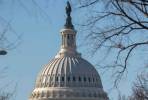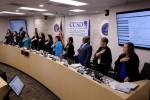BLOG: If taxes don’t go up, is it a tax increase?
CARSON CITY — With just three days to go until the constitutionally mandated deadline for the 2017 session of the Nevada Legislature, there’s a looming budget problem that could have a huge impact on the state over the next two years.
As the Review-Journal’s Sean Whaley explains here, the problem centers around the initial failure of the capital improvement projects budget. Senate Republicans voted in unison against the capital projects bill this week in protest against majority Democrats refusing to approve the controversial Education Savings Account program. As a result, the bill failed on a vote of 12 ayes and 9 nays.
Why did it fail when the majority supported it? The answer to that question finds its roots in the Nevada Constitution, in Article IV, Section 18, known popularly as the Gibbons Tax Restraint Initiative. Inserted into the Constitution by initiative in 1994 and 1996, the provision requires a vote of two thirds in both houses of the Legislature if a measure “creates, generates, or increases any public revenue in any form, including but not limited to taxes, fees, assessments and rates, or changes in the computation bases for taxes, fees, assessments and rates.”
As it turns out, the capital improvement budget would re-authorize a 17-cent property tax that goes to pay for debt service on construction bonds. If the capital projects budget doesn’t pass, that tax would be lowered.
According to the Legislative Council Bureau, that means the capital projects budget requires a two-thirds vote.
But does it, really?
The bill would not, in fact, create or generate a tax, because the tax already exists. In addition, it would not increase public revenue in any form, because it would maintain an existing tax for ongoing expenses. (Failing to pass it would have negative impacts on the state’s bond rating, and would require $270 million in general fund money over the coming biennium.)
In addition, the measure would not change the computation base for taxes, fees, assessments or rates.
It appears the question comes down to an age-old, much debated question: If a tax is scheduled to expire, or will expire without further legislative action, is maintaining that tax at the current rate considered a tax increase, notwithstanding the fact that the underlying amount will not change? Or, should a tax be considered increased only if the underlying amount actually rises?
In past years, the Legislative Counsel Bureau has listed the capital budget as requiring a two-thirds supermajority, while in other sessions it has not. The bill has always received two-thirds support, however, regardless of whether the requirement was listed on the bill.
I’ve have always argued that a tax increase must involve either the creation of a new tax, or the actual increase in the rate or amount of an existing tax. (I maintain that’s true even if a tax would decrease absent legislative action.) Back in 2009, I argued that extending a set of taxes that were slated to expire should only require a simple majority, since it did not create, generate or increase an existing rate of taxation.
That view, obviously, is not shared by the lawyers who advise the Legislature, which has created the standoff over the capital projects budget. But that may be just as well: If a simple majority were to approve the budget, and a lawsuit challenging the spending were to result, a court could invalidate a host of projects.
That means the solution to the standoff will likely be found in political, not legal, arguments.




























